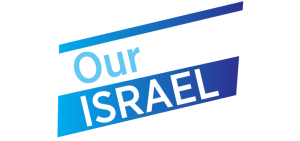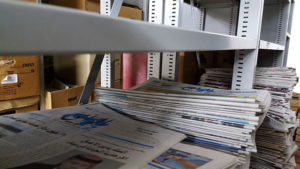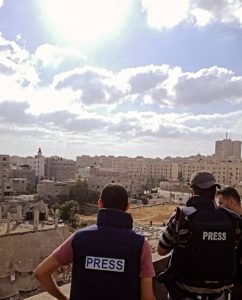- About Us
- Policy Center
- Learn
- Press Room
- Blog
- Get Involved
- Donate
- Donate to J Street Online
- Make a Gift in Someone’s Honor or Memory
- Make a Monthly Gift
- Tax-Deductible Donations
- Giving by mail

J Street’s “Our Israel” project spotlights the amazing Israeli groups who share our progressive vision for Israel, and who are helping build a society underpinned by the founding values of democracy, self-determination and equality which are enshrined in Israel’s Declaration of Independence.

In 2006, at the height of a conflict between Israel and Lebanon, 18 Israeli-Arabs civilians died as a result of Hezbollah rocket fire. Watching on was Israeli-Arab journalist Ghada Zoabi, who was particularly concerned that the high Israeli-Arab death toll could have been preventable if Israeli-Arabs were better informed on how to protect themselves and others during wartime.
This realization led her to found Bokra – an Israeli Arabic news site. Today, Bokra draws around 850,000 visitors a day. “The media is a very influential tool in creating an impact,” Zoabi says. “When we talk about our visitors, we’re talking about people looking for content that will inform how they think,” she explains.
While it is an Arabic news site, unlike many others of its kind, it is not connected to a political party nor a print weekly. And unlike a range of smaller sites, Bokra aims to cover Israeli-Arab affairs nationally.
‘Bokra,’ which means ‘tomorrow’ in Arabic, is more than just a news organization. Zoabi designed the website as a home for social initiatives, furthering her mission of affecting change in society. She wants Bokra to make Israeli-Arabs and Palestinians in the Occupied Territory aware of the injustices they face and give them the tools for nonviolent ways to challenge the status quo.
Encouraging Voting Within Arab Society
In March of 2021, Bokra launched an initiative to encourage Arab participation in future Israeli elections. They knew they faced an uphill battle. In the previous election, when Arab voters were gaining crucial importance as a voting bloc, the power of the Arab parties had simultaneously weakened. While the power of their vote mattered more than ever, over half of Arab voters did not reach the ballot box.
Bokra set out to learn what caused the historically low voter turnout of Arab voters in the elections. They discovered via polling the community that many voters had experienced a loss of faith in the democratic process. According to their research, many had given up on electoral politics because of their overall frustration with the situation their community faced – from the growing attacks on Arab and Palestinian activists, escalating right-wing extremism, and frustration with the government’s treatment of of Arabs and Palestinians.
They created a campaign dedicated to encouraging voting amongst what Zoabi views as one of the most essential parts of the Arab electorate – women. “Women can create huge changes,” Zoabi says. “In every initiative where we have centered women, we have achieved major results.”
Bokra created videos of women talking about why they vote, which they ran across their website, on various forms of social media, and on advertising platforms. They bought out billboards in Arab neighborhoods centering on the initiative. And they worked with women across the country from all different backgrounds to gain their valuable perspectives.
Through all this, they are setting the groundwork for greater electoral participation by Arab citizens the next time Israelis go to the polls.

A Shared Language of Coexistence
While Bokra began as a platform for Arab-Israelis and Palestinians, its audience has expanded to include Jewish Israelis. In 2015, at a time of heightened violence in the region, Bokra launched the first of what became many coexistence projects. Zoabi said that she decided to launch the campaign on social media, billboards, and with a video in Hebrew and Arabic, all that promoted living together in peace, in an effort to calm the violent situation in the country. “I think that when we come together, we can really start to accept each other,” a woman says in one of the videos.
The backlash was swift. Many felt that Bokra had betrayed its Arab base by including Jews in its new initiative. “We tried to explain that the goal is not to appear self-righteous to the Jews, but to tell ourselves that violence will not solve our problem,” Zoabi explained to Al-Monitor at the time.
The harsh reactions didn’t stop Zoabi from continuing her coexistence work over the following seven years. “I just want to show this generation that there are Jewish people who want to talk to you. They want to learn about your situation, and they respect your narrative,” she tells J Street.
She knows this work is all the more important now, as there has been an increase in violence in the region. With increased settlement expansion, demolitions, and terror attacks, Bokra is working overtime to lower the temperature. Zoabi understands the suffering that many Palestinians experience – and wants to help ensure that they don’t channel it, harmfully and counterproductively, into violence.
Bokra’s newest coexistence initiative is focused on where many conversations happen these days – social media. According to their research, an overwhelming majority of young Palestinians are exposed to violent content on social media daily.
The new campaign’s slogan is ‘violence is not our language.’
Their goal is to speak a language of coexistence rather than one of violence and resentment. With a dedicated Facebook page, a wide-spanning digital campaign, and other forms of content across different mediums, Bokra is working to create a more peaceful future.
Media as a tool
“It’s important to me as a journalist to use this to effect change,” says Zoabi. While many organizations in Israel and the Occupied Territory focused on coexistence and peacebuilding, Zoabi sees her work as filling a unique need in the media ecosystem for both Israelis and Palestinians alike. “If you can influence the media, it’s an easy way to achieve your desired outcome, especially when talking about people who spend most of their time online,” she explains.
Zoabi knows that she faces significant and structural barriers in her lofty goal of creating a more peaceful future. “We know that we live in a complicated reality. But through our social initiatives, content, and work, we are working every day to get results.”
You can visit Bokra’s website here.